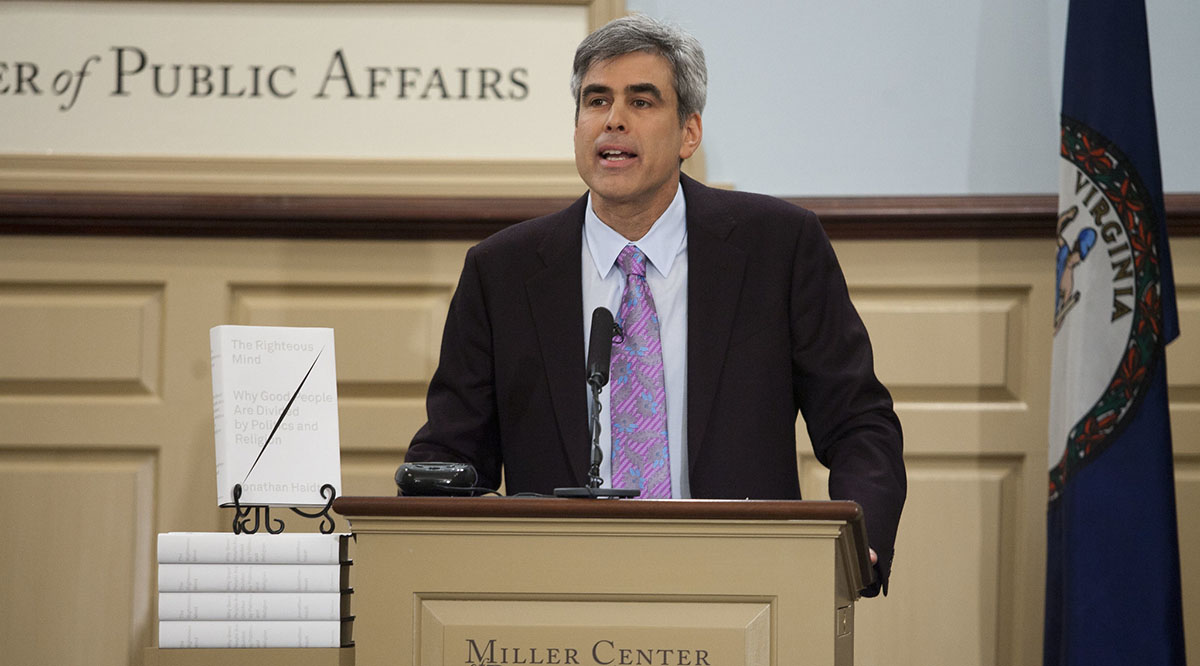
For medical doctors and scientists, there’s no better way to prove a point than to show evidence: a study, a set of data, a chart. But amid today’s cultural divisions, giving Americans research-based evidence to sway them on contentious issues — such as vaccines, climate change, and health care access — often doesn’t work and sometimes backfires. Some people dismiss the evidence and harden their views.
That doesn’t surprise Jonathan Haidt, PhD, a social psychologist whose decades of research focus on morality — research that led him to challenge conventional beliefs about how people make moral judgments. Those judgments arise not from reasoning, he contends, but from intuitions that develop through a complex mix of personal and cultural factors.
“If you think moral reasoning is something we do to figure out the truth, you’ll be constantly frustrated by how foolish, biased, and illogical people become when they disagree with you,” Haidt wrote in his 2012 bestselling book, The Righteous Mind: Why Good People Are Divided by Politics and Religion.
How, then, can people of different political and social beliefs talk constructively about issues that involve morality? Haidt, a professor at NYU Stern School of Business, believes that they must start by respecting each other’s moral motives. From a moral perspective, he says, each side is right in some way about the priorities that concern them most.
On Nov. 9, Haidt will discuss his theories in a plenary session at the AAMC’s annual meeting, Learn Serve Lead 2021: The Virtual Experience, that is focused on whether the United States can return to a time of civil discourse that includes respect for opposing views. He recently shared some of his thoughts in a conversation with AAMCNews.
The conversation has been edited for brevity and clarity.
You made a few statements in The Righteous Mind that might take some people in the medical field aback. You wrote, “You can’t change people’s minds by utterly refuting an argument,” and “For nonscientists, there’s no such thing as a study you must believe.” What does it mean for scientists when you say that empirical evidence might be useless in discussions about societal issues that involve science?
Let’s start with the basic psychological question of, “How does human reasoning work?” My book is an argument that [philosopher] David Hume was right when he said, “Reason is and ought only to be a slave of the passions.” Let’s apply that to medicine.
Let’s assume doctors are scientists, doctors are perfectly rational — but they have to deal with all of these irrational people. What should they do? That’s where medical doctors and psychiatrists might find the rider and the elephant analogy useful.
Most cultures that leave us a wisdom literature have noticed that the mind is divided into parts that sometimes conflict, such as a horse and rider. I prefer to make the animal part be much larger and smarter, so I think the best analogy is that the mind is divided like a small rider on a very large elephant. The rider is our conscious reasoning, and the elephant is the other 99% of mental processes, which occur outside our conscious awareness but govern most of our behavior.
The rider can sometimes lead the elephant, if the elephant has no desires at the moment, but generally it’s the elephant that calls the shots. The rider mostly helps the elephant to get where it wants to go. The rider can’t force the elephant to do anything it doesn’t want to do.
What does that mean for how we might influence people’s decisions about the right thing to do?
You can’t just talk to the rider and expect that to change a person’s behavior. If you tell the person, “Look, if you don’t lose weight, you’re going to die in six months,” sometimes that will work — but often that won’t. You have to make the person deeply feel and want to make the change. That’s the first step for doctors: just understanding how you persuade those irrational nonscientists out there.
The harder step is to say, “What if doctors are human beings, too? What if doctors and medical researchers are not perfectly evidence-driven? What if they’re driven by things like self-interest and politics like everyone else?”
Focusing on the elephant’s preferences means that each side has to understand the other through the world they live in and what motivates them, right? I found it wonderful that you cited the movie “The Matrix” as a frame for thinking about the bubble that we live in — the place where we see and hear things that confirm our “grand narrative” of ourselves and the world. Can you apply that idea to our current social divisions?
The short book that I’m about to start writing is called Life After Babel: How to Live in a World That May Never Again Be Shared. Because of social media — and media changes and technological changes in general — we are flying off into little bubbles of meaning that are often small. They’re unstable. And there may never again be any stable and shared understanding of anything important.
So for some on the left, it’s very easy to see the QAnon people and “the big lie” about the election. It’s very easy to see the bubble that people are living in on the other side, but it’s very hard to see it on your own side.
For some on the right, it’s very easy to see how the left is now imposing all kinds of restrictions on what its members can say about race, gender, the environment, and trans issues. They [on the right] get a constant stream of posts about how people get mobbed and fired for saying anything that questions the dominant narrative.
As I see it, the Tower of Babel fell in around 2015. It may be decades before we have the ability to anchor our discussions in a common reality. I don’t think we’re going to see it in our lifetime.
You also write about how tribalism blinds people to the morals and motives of their opponents. Can you apply that to current social issues?
There’s this wonderful Bedouin proverb: “Me against my brother; me and my brother against our cousin; me, my brother, and cousin against the stranger.” Because we’ve evolved from tribalism, we will come together with people who were our enemies as long as they are on our side in the current conflict.
There used to be multiple crosscutting conflicts among interest groups. Now there’s just one, which is the left/right cultural war in America. We have this two-party system, we have a crazy media environment. Everything has gotten sucked into a single tribal division, which is Republican/Democrat, left/right.
So, in a conversation between people on the left and the right, there’s very little hope of changing somebody’s mind based on evidence-based reasoning, because that somebody would have to go against their tribe. They would have to change their view of who they are and whom they identify with.
That’s right. Once people begin to see a person or organization as being on the red team or the blue team, it becomes very hard for them to listen with an open mind to that person or organization. And this is why I believe that those who lead culturally significant institutions and professions have a fiduciary duty — a moral duty — to depoliticize themselves and their statements. They must not play culture war games. They must be above the fray to be trusted. Any organization that takes sides deserves to lose the trust of the public. I believe this has happened to universities, to newspapers, and to the medical profession.
How about those who say that it’s time for organizations to take sides on some issues, because these issues are too important for these organizations to sit on the fence?
I’d say such people will end up advocating an all-out cultural war, which they cannot win. I think it’s crucial that, in our society, we do not have all-out war in every institution. When I go to a restaurant, I do not want that restaurant fighting against Republicans; I want them to cook excellent food. When I go to my doctor, I want my doctor to make me healthy; I don’t want my doctor using me to advance her other social and political causes. When I send my kids to public school, I want them to be educated; I don’t want them pressured to say things that please one side of the culture war.
This is one of the reasons we’re falling apart: because many of our institutional leaders have abandoned their telos to fight the left/right cultural war. Since nearly all of our culturally significant institutions lean left, this means they lose the trust of people on the right — they lose the ability to persuade the right.
